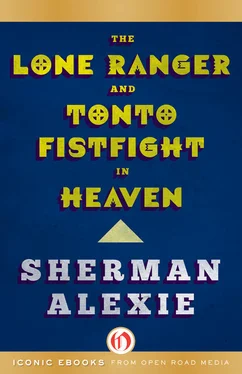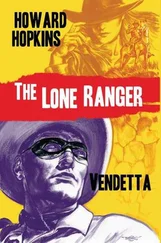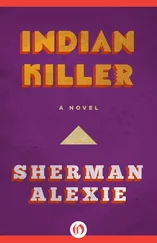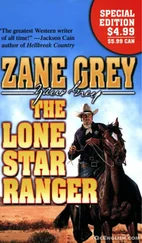“Uncle Moses,” he said through his fingers. “Tell me a good story.”
Uncle Moses sat down in the story chair and told this very story.
THE FINISHING
My mother sits quietly, rips a seam, begins to hum a slow song through her skinny lips.
“What you singing?” I ask.
“I’m singing an it-is-a-good-day song.”
She smiles and I have to smile with her.
“Did you like the story?” I ask.
She keeps singing, sings a little louder and stronger as I take my Diet Pepsi outside and wait in the sun. It is warm, soon to be cold, but that’s in the future, maybe tomorrow, probably the next day and all the days after that. Today, now, I drink what I have, will eat what is left in the cupboard, while my mother finishes her quilt, piece by piece.
Believe me, there is just barely enough goodness in all of this.
THE FIRST ANNUAL ALL–INDIAN HORSESHOE PITCH AND BARBECUE
SOMEBODY FORGOT THE CHARCOAL; blame the BIA.
I’ve never heard any Indian play the piano until Victor bought a secondhand baby grand at a flea market and hauled it out to the reservation in the back of a BIA pickup. All that summer the piano collected spiders and warm rain, until it swelled like a good tumor. I asked him over and over, “Victor, when you going to play that thing?” He would smile, mumble some unintelligible prayer, and then whisper to me close, “There is a good day to die and there is a good day to play the piano.” Just before the barbecue Victor pushed the piano halfway across the reservation, up against a pine tree, flexed his muscles, cracked his knuckles, sat down at the keys, and pounded out Béla Bartók. In the long silence after Victor finished his piece, after the beautiful dissonance and implied survival, the Spokane Indians wept, stunned by this strange and familiar music.
“Well,” Lester FallsApart said. “It ain’t Hank Williams but I know what it means.”
Then Nadine said, “You can tell so much about a family by whether their piano is in or out of tune.”
There is something beautiful about the cool grass beneath a picnic table. I was there, almost asleep, when my love crawled under, wrapped her arms around me, and sang into my ear. Her breath sweet and damp with Kool-Aid and a hot dog, mustard but no catsup, please . The sunlight squeezed through spaces between wood, fell down knotholes, but just enough to warm my face.
There is something beautiful about an Indian boy with hair so black it collects the sunlight. His braids grow hot to the touch and his skin shines with reservation sweat. He is skinny and doesn’t know how to spit. In the foot race with other Indian boys he wins a blue ribbon, and in the wrestling match he wins a medallion with an eagle etched in cheap metal. There are photographs taken; I use them now as evidence of his smile.
There is something beautiful about broken glass and the tiny visions it creates. For instance, the glass from that shattered beer bottle told me there was a twenty-dollar bill hidden in the center of an ant pile. I buried my arms elbow-deep in the ants but all I found was a note that said Some people will believe in anything . And I laughed.
There is something beautiful about an ordinary carnival.
Simon won the horseshoe pitch with a double-ringer that was so perfect we all knew his grandchildren would still be telling the story, and Simon won the storytelling contest when he told us the salmon used to swim so thick in the Spokane River that an Indian could walk across the water on their backs.
“You don’t think Jesus Christ was walking on just faith?” he asked us all.
Simon won the coyote contest when he told us that basketball should be our new religion.
He said, “A ball bouncing on hardwood sounds like a drum.”
He said, “An all-star jacket makes you one of the Shirt Wearers.”
Simon won the one-on-one basketball tournament with a jump shot from one hundred years out.
“Do you think it’s any coincidence that basketball was invented just one year after the Ghost Dancers fell at Wounded Knee?” he asked me and you.
And then Seymour told Simon, “Winning all those contests makes you just about as famous as the world’s best xylophone player.”
All the Indians were running; they were running. There was no fear, no pain. It was the pleasure of bare foot inside tennis shoe; it was the pleasure of tennis shoe on red dirt.
That Skin with the long hair leaning against the pine tree, yes, that one , is in love with that other Skin sitting at the picnic table drinking a Pepsi. Neither has the words to describe this but they know how to dance, yes, they know how to dance .
Can you hear the dreams crackling like a campfire? Can you hear the dreams sweeping through the pine trees and tipis? Can you hear the dreams laughing in the sawdust? Can you hear the dreams shaking just a little bit as the day grows long? Can you hear the dreams putting on a good jacket that smells of fry bread and sweet smoke? Can you hear the dreams stay up late and talk so many stories?
And finally this, when the sun was falling down so beautiful we didn’t have time to give it a name, she held the child born of white mother and red father and said, “Both sides of this baby are beautiful.”
IMAGINING THE RESERVATION
We have to believe in the power of imagination
because it’s all we have, and ours is stronger
than theirs.
— Lawrence Thornton
IMAGINE CRAZY HORSE invented the atom bomb in 1876 and detonated it over Washington, D.C. Would the urban Indians still be sprawled around the one-room apartment in the cable television reservation? Imagine a loaf of bread could feed the entire tribe. Didn’t you know Jesus Christ was a Spokane Indian? Imagine Columbus landed in 1492 and some tribe or another drowned him in the ocean. Would Lester FallsApart still be shoplifting in the 7-11?
I am in the 7-11 of my dreams, surrounded by five hundred years of convenient lies. There are men here who take inventory, scan the aisles for minute changes, insist on small bills. Once, I worked the graveyard shift in a Seattle 7-11, until the night a man locked me in the cooler and stole all the money out of the cash register. But more than that, he took the dollar bill from my wallet, pulled the basketball shoes off my feet, and left me waiting for rescue between the expired milk and broken eggs. It was then I remembered the story of the hobo who hopped a train heading west, found himself locked in a refrigerator car, and froze to death. He was discovered when the train arrived at its final destination, his body ice cold, but the refrigerator car was never turned on, the temperature inside never dropped below fifty degrees. It happens that way: the body forgets the rhythm of survival.
Survival = Anger × Imagination. Imagination is the only weapon on the reservation.
The reservation doesn’t sing anymore but the songs still hang in the air. Every molecule waits for a drumbeat; every element dreams lyrics. Today I am walking between water, two parts hydrogen, one part oxygen, and the energy expelled is named Forgiveness .
The Indian child hears my voice on the telephone and he knows what color shirt I’m wearing. A few days or years ago, my brother and I took him to the bar and he read all of our futures by touching hands. He told me the twenty-dollar bill hidden in my shoe would change my life. Imagine , he said. But we all laughed, old Moses even spit his false teeth into the air, but the Indian child touched another hand, another, and another, until he touched every Skin. Who do you think you are? Seymour asked the Indian child. You ain’t some medicine man come back to change our lives . But the Indian child told Seymour his missing daughter was in community college in San Francisco and his missing wedding ring was in a can of commodity beef high up in his kitchen. The Indian child told Lester his heart was buried at the base of a pine tree behind the Trading Post. The Indian child told me to break every mirror in my house and tape the pieces to my body. I followed his vision and the Indian child laughed and laughed when he saw me, reflecting every last word of the story.
Читать дальше












